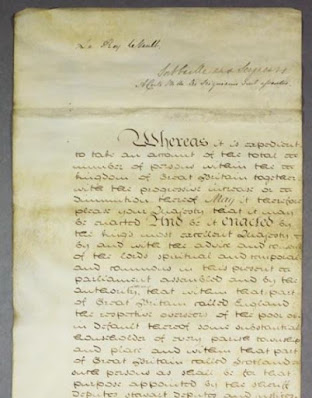What do you know?
The first piece of advice I ever received from someone about my family tree, was go from what you know to what you don't know. What this means is that information and documents the family currently has will lead you to the past and the ancestors you want to track down.
First, starting with yourself, write down what you already know about your own family and ancestors on an Ancestoror Pedgree Chart, or Family Sheet. Proceed backward in time, one generation at a time.
Hopefully, one day you will end up with a chart that looks like this:

Next, find out as much as you can from any elderly people in the family, sadly, they may not have a lot of time left for you to do so. One way to do this is to talk to them about the past, and who their parents/grandparents were and tape the conversation. Taping is better than trying to write it all down for two reasons - you can keep the tape, and it lets the conversation flow without interruption. What you are doing is creating an oral history.
Some of the questions to ask (thanks to Family Search) will be:
- What is your full name? When and where were you born? Who did you marry & where?
- Do you have photos of your family members that we could look at?
- Who is your father? Mother? When and where were they born? Married?
- What are the names of your brothers and sisters? When and where were they born?
- Whatschools did they attend? Who did they marry?
- What memories can you share about your father? Mother? Siblings?
- What religions were practiced in your home?
- What do they know about immigration and the 'home country'?
- What jobs do you remember your parents and other family members doing?
- Will you show me some of your old family documents or artifacts?
- Do you have things like family Bibles that might have names and birth dates in them?
- Is or was anyone in the family interested in family history? Do you have any records about the family?
- Make sure your recording equipment works well and has all the battery life etc. you need.
- Be aware that microphones can make people feel intimidated, so you might need to resort to pen and paper. Having a 3rd person to take notes can be useful.
- Have a list of questions ready.
- If you can, give the person time to prepare for the interview, this way you may uncover more information than you expect.
Sometimes, you may find yourself at a family group outing, and this is when a phone with a recorder can be very useful, but may also record a lot of noise, so time for the family sheets, pen and paper!- Take any family photos along with you that you are trying to identify.
- After the interview do a pedigree chart and check you have the information correct with the person you interviewed.
| Pedigree Chart |
Work your way through your family and interview as many people as you can. Let everyone know you are doing the family history. If you are interviewing close members of the family, and have more time, you may want to use a much more extensive list of questions, this site has a great set :UCLA family history
The other way to record information is by using family sheets, this one from ancestry is a free pdf download, and is easy to use. Ancestry pdf - Family Sheet. Family sheets are very useful as they allow you to see what information is missing quite quickly.
| Family Sheet |
Its time to think about sources! Sometimes, information that has been in the family for a long, long time is incorrect. If you want proof, take a look at one of my early blogs, I cant believe I'm not French! (and sadly, I'm not) Record all your information from family that is verbal as "Personal Knowledge", and then look for other primary sources to back it up.
There are some good videos to view that will help get you started, try:
Family Search
Beginning your family tree
Ancestry
Finaly, here are some golden rules to consider:
Begin with known facts and work backwards – checking the validity of each new piece of information against an original record.
Always consider when, where, how and why, about an event.
Document your sources at each stage, whether that’s a person, or a piece of paper. Remember, everything is speculation until verified.
Read documents carefully, they contain more information than is obvious at first.
Always keep a record, even if an avenue of research proves to be fruitless – it will stop you making the same mistake again at a later stage. Be organised .
Do your own research. Don’t assume that information supplied to you by another party is accurate, and always check the authenticity of information you find online.

Comments
Post a Comment
Thank you for your comment on my Blog. I love to get feedback and information to share from my readers.
To keep up to date simply follow me on facebook or subscribe using the button at the top of the blog page.
Barb